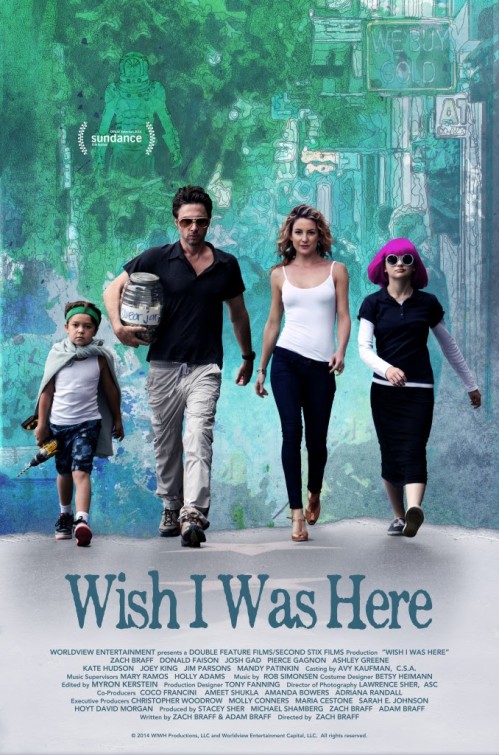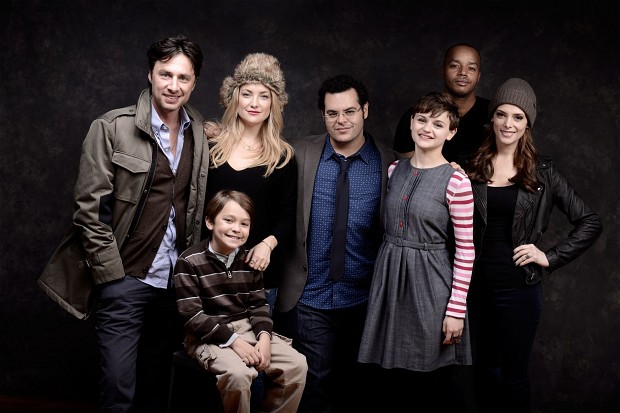Genre: Drama
Premise: When a struggling actor’s father is diagnosed with cancer, he must finally grow up and become the patriarch of his family.
About: This film received a lot of press when writer-director Zach Braff raised the funds for the film on Kickstarter. There was some initial backlash, as some noted that Braff would’ve been able to raise the money by traditional means anyway. But Braff argued that doing it the Kickstarter way enabled him to make “no sacrifices.” Which means, of course, that for better or worse, this is exactly the film Braff wanted you to see. Braff’s previous writer-director entry, Garden State, was a surprise hit at Sundance and went on to gross 10 times its budget. Everyone kept asking him, “When are you going to direct again?” Well, 10 years later and Braff’s second movie is finally here!
Writer: Adam J. Braff and Zach Braff
Details: 120 minutes
The Wish I Was Here experience can be summed up by its title. Many hours after I saw the film, I casually wondered, “Why didn’t he just call it ‘Wish You Were Here’ as opposed to this strange variation on the phrase?” Then I realized, “Ohhhhhh. The ‘I’ is a play off the phrase, implying he wishes he was currently present in his life.” I felt a little dumb for missing that, but upon further reflection I realized, “Wait a minute. That was kind of a clumsy play on words. By no means was it obvious.” Which pretty much summarizes the movie itself, a clumsy story that wasn’t easy to get.
The script starts off strong, with a traditional setup of goals, stakes, and urgency. Aiden (Braff) a struggling actor with an 8 year old son and 11 year old daughter, has been married to his wife since college. His kids go to a prestigious private Jewish school courtesy of Aidan’s rich father. But when his father gets cancer and must pay out of pocket, the checks to the school stop, and all of a sudden, Aiden’s free ride in life is over. For the first time ever, he must figure out a way to provide for his children, which means he must consider giving up his acting dream.
Goal = find a way to keep his kids out of public school. Urgency = the check to the school is due in a couple of weeks. Stakes = if he doesn’t figure it out, he might have to give up his dream.
Okay, I can get on board with that, even if the goal is a little “Rich People’s Problems.” But thennnnnnnn… the second act comes. Second acts are where screenwriters make their money. The professionals know how to write them. The posers fake their way through them. And there was never a second act more faked through than “Wish I Was Here.”
Structure is the tool that creates narrative. You make sure your characters are going after something, and that that something is clear and has consequences. That’s what pushes your characters forward, giving them things to do and actions to achieve. The second we stop understanding what your characters are going after and why, we lose interest.
Look at a movie like Raiders of the Lost Ark. What happens if, once we hit the second act, Indiana heads off to Iceland, buys a cottage, makes friends with the locals, and becomes a carrot farmer? You’d be confused, right? You’d say, “Wait, wasn’t he going to go after that Staff of Ra thing? Isn’t that what the beginning of the movie was about?”
Yet that’s exactly how Wish I Was Here unfolds (or should I say “unravels”). Once we’ve set up the goal (figure out how to keep the kids out of public school), we go through one tiny sequence of Aidan trying to home school his kids (which was silly – but at least he was pursuing the goal that was set up), and then that was it. The “keep the kids in private school” thing was forgotten.
Instead, we drifted from scene to scene focusing on characters discussing the complexities of life (from dying dad to recluse brother to frustrated wife to confused kids).
One particular scene embodied this problem. It occurred midway through the film when Aidan and his wife (played by Kate Hudson) are sitting alone on a Life Guard chair on the Santa Monica beach, at night, talking about how they used to be happy.
This is the kind of scene that you, as a screenwriter, should kill people to avoid. It is the definition of a “scene of death” (scenes of deaths are screenplay killers). It’s also common for amateur writers to misinterpret these scenes for “good writing.”
And why not? “Important” things are being discussed (life, love, regret!). But a discussion about these trite obvious life experiences never offers anything more than impatient seat-shifting. First, the scene is on the nose. Characters talking about their feelings is almost always boring unless it’s a climax scene where they’ve spent the entire movie holding back and are only now letting loose.
Second, two characters sitting down talking is almost always a bad idea. It’s the definition of stagnant so it almost always plays dead. Third, you never want characters talking about their backstory together unless said backstory reveals something surprising or adds something important to the story. Characters discussing things that we’ve already assumed, such as they were once happy (Of course you were once happy! You got married!) is never a recipe for a good scene.
But the worst part about this scene is that when you sit two characters down in a comfortable environment with nothing else going on and a seemingly endless amount of time at their leisure, you say to your audience, “There is nothing going on in my movie right now.” Because if there was something important going on in your movie, your characters would be dealing with it. They wouldn’t be out here droning on about when they first met.
Assuming that the point of this scene was to show that these two were once happy (which I still think is a pointless scene since we already know that), let’s compare it to a scene from American Beauty that is sort of trying to do the same thing.
In the scene, Lester (the main character) has just bought a 1970 Pontiac Firebird without telling his wife. She stumbles in to find Lester carelessly drinking beer on the couch and angrily demands to know whose car that is in their driveway. He tells her it’s his. “Where is the Camry?” she asks. “I traded it in.” After arguing a bit longer, Lester pulls Carolyn close, and all of a sudden, the mood is charged. Everything about the present is forgotten. They’re young again. They’re excited.
They descend onto the couch like teenagers when Carolyn notices that—“Lester. You’re going to spill beer on the couch.” And just like that, the moment is ruined. The two go back to jabbering before Carolyn eventually storms out of the room.
Notice how much more is HAPPENING in this scene than in the “Wish I Was Here” scene. It starts off with a problem, creating conflict from the outset. “Whose car is that in our driveway?” The scene then makes an unexpected turn in the middle, when Lester makes a move and the unthinkable happens – Carolyn is actually into it.
This part is important, because we’re seeing an action that shows us how they used to feel about each other. He’s not telling her, “Remember when we used to like each other?” We’re seeing it. Then the scene turns again when Carolyn lets her obsession about inconsequential things get the best of her and the moment is lost. So not only is there something happening in the scene, but we’re exploring character as well (Carolyn’s flaw of not being able to “let go”). How much more interesting is this than two people sitting next to each other like robots and saying, “Remember when we used to like each other, bee-beep booop?”
But but but! I want to play devil’s advocate here. If I were Zach Braff, I’d probably defend my script by saying, “Carson, you’re focusing too much on these tired “rules” of screenwriting that there has to be a “goal.” That the plot always has to be straightforward and easy to follow. My movie’s not like that. My movie is about characters and how they interact with one another, how they battle life’s complexities and problems. It’s not about having a clear A to B story.”
Okay, that’s a fair argument. There are successful movies that do this. And to a certain extent, I agree. If you have an interesting set of unresolved relationships in your script, then the “narrative,” (the thing that drives the reader to keep reading) is to see if and how these relationships are going to resolve themselves. That’s how When Harry Met Sally works. We stick around solely to see if they’re going to get together.
And Braff definitely puts a lot of effort into this area. Aidan’s dad doesn’t like how Aidan is an actor. Aidan’s dad doesn’t like Aidan’s brother for being such a dumbo. Aidan and Aiden’s brother don’t talk as much as Aidan wants them to. Aidan and his wife are struggling to find the love they once had. Aidan doesn’t agree with his kids’ infatuation with the Jewish culture.
I agree that, assuming we care about these relationships, that theoretically they can carry the script. But therein lies the problem. I didn’t care about the relationships. And it was mostly because of scenes like the one above. Instead of characters EXPERIENCING problems, they would often TALK about problems. And there isn’t a whole lot dramatically exciting about people talking about their problems. It goes back to the oldest screenwriting rule in the book. Don’t tell us. SHOW us. And there were too many “Character A sits across from Character B and talks about life” TELL scenes.
That’s why story is so important, why character problems aren’t enough. Story forces characters to act instead of sit around and talk. Which means characters are changing through action as opposed to conversation. The only action in Wish I Was Here were gimmicky scenes that had nothing to do with the story – like going out and test-driving a Maserati to feel better about themselves – empty visual experiences.
Wish I Was Here tries so hard to be that emotionally moving movie about life and death, but Braff doesn’t have the writing skills to pull it off. Too much talking, not enough happening.
[ ] what the hell did I just watch?
[x] wasn’t for me
[ ] worth the price of admission
[ ] impressive
[ ] genius
What I learned: Beware Peacock Dialogue. Braff has a nasty habit of drawing attention to his favorite lines of dialogue. He spotlights these moments by stopping all space and time so that YOU KNOW HE LOVES THIS LINE. These lines scream, “I want to be in a trailer!” and have that larger than life feel. These sound right at home in a trailer, but are too big and showy to work in the moment. “You can pick ANY ONE you want, as long as it’s unique and amazing… like you.” “When we were kids, my brother and I used to pretend that we were heroes, the only ones who could save the day. But maybe we’re just the regular people. The ones who get saved.” Dialogue should always serve the moment. If it becomes bigger than the moment, it’s a peacock (sprouting its feathers) and draws attention away from the scenery behind it.



